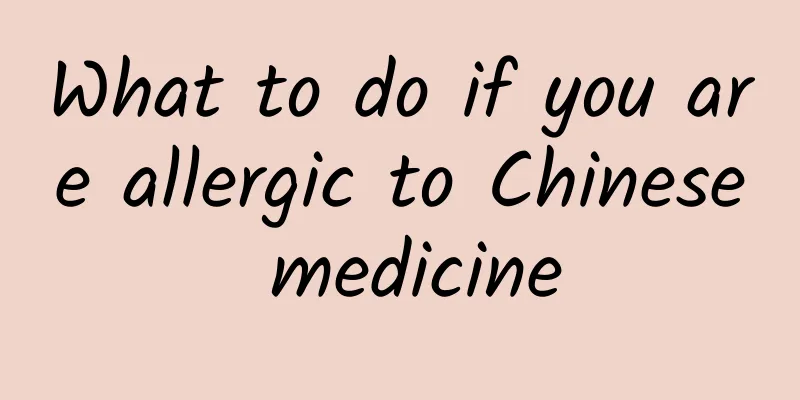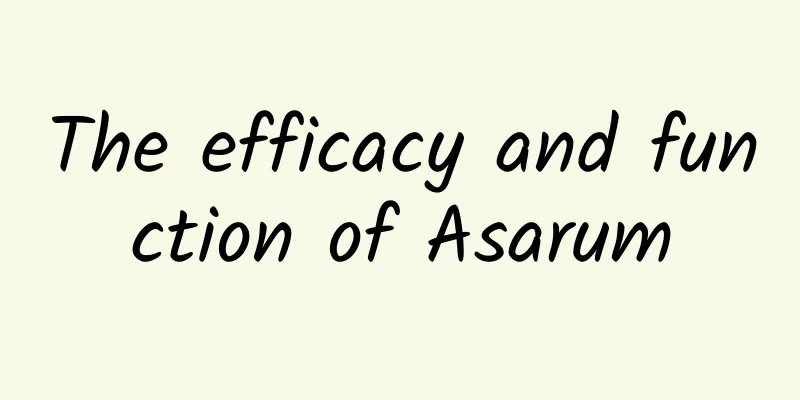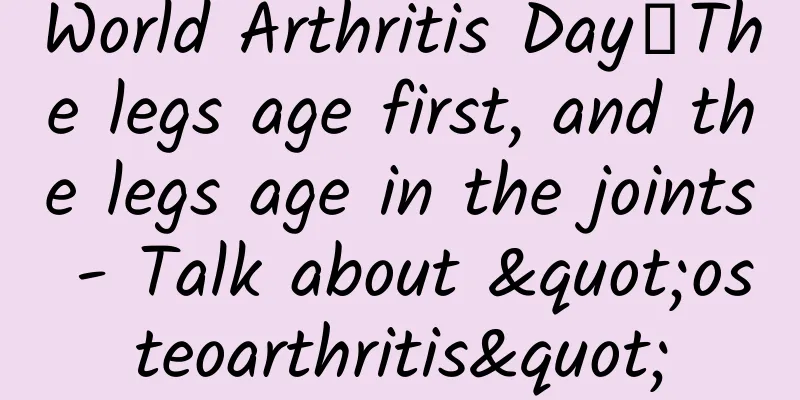What to do if you are allergic to Chinese medicine

|
Some people with allergies may be allergic to many objects. When we are receiving infusions in the hospital, we often see doctors conducting skin tests on patients first to see if they are allergic to drugs such as penicillin. Allergy is also a very serious problem. Severe allergies can cause the body to go into shock. Some people may also have allergic reactions to traditional Chinese medicine. Here is how to treat if you are allergic to traditional Chinese medicine. Beware of drug allergies when taking Chinese medicine Some people often suffer from allergies to elements, metals or drugs due to their physical condition, and drug allergy is also a very scary phenomenon. We often see that in hospitals, when injecting drugs, patients are usually given a skin test first to prevent them from having an allergic reaction to the drugs. Drug allergy often manifests as skin flushing, itching, palpitations, rash, and difficulty breathing. In severe cases, shock or death may occur. An allergic reaction is an abnormal immune response. Abnormal immune response, whether too strong or too weak, is harmful to the body and can cause a series of diseases; this situation caused by drugs is drug allergy. There is an immune system in the human body. When pathogens or other foreign substances invade the body, the immune system will produce an immune response to eliminate the pathogens. This is an immune response that is beneficial to the human body. However, some children have too strong a defense function, which can cause an overly strong reaction to certain substances, and even cause tissue damage and lesions. This becomes an immune response that is not conducive to the human body, also known as an allergic reaction. Allergic reactions are a problem that cannot be ignored. Some Chinese medicines can also cause allergic reactions, such as Andrographis paniculata, Shuanghuanglian, Houttuynia cordata, Callicarpa ovata, Cuttlefish bone, Lingchi Jiedu Pills and Yunnan Baiyao, which can all cause anaphylactic shock. Judging from the incidence of allergies, the sensitization rate of chemical synthetic drugs is higher than that of natural drugs, and the sensitization rate of traditional Chinese medicine is lower than that of Western medicine. Of course, the problem of allergy to traditional Chinese medicine cannot be ignored. If you suspect that certain Chinese medicines in a compound medicine may cause allergies, you can take them orally one by one to observe the reaction. Which types of Chinese medicine are likely to cause allergies? Traditional Chinese medicine can generally be divided into plant medicine, animal medicine and mineral medicine, among which insect medicine is most likely to cause allergies. Data show that there are more than 100 kinds of Chinese herbal medicines that can cause allergies. Among them, plant-based Chinese medicines such as Houttuynia cordata, Andrographis paniculata, Isatis root, Salvia miltiorrhiza, Xanthium sibiricum, Rehmannia glutinosa, and Bupleurum chinense are prone to cause allergies; animal-based Chinese medicines such as leeches and toads are more likely to cause allergic reactions; mineral-based Chinese medicines such as borneol, realgar, and gypsum can also cause allergic reactions. There is also a type of Chinese medicine that is photosensitizing, such as Psoralea corylifolia, Angelica dahurica, Rhizoma Cibotii, Schizonepeta tenuifolia, Saposhnikovia divaricata, and Adenophora stigma. After taking them, patients may become more photosensitive and develop solar dermatitis. Allergic reactions caused by traditional Chinese medicine are similar to those caused by Western medicine, and generally include the following allergic phenomena. Skin allergic reactions: The main manifestations are urticaria, scarlet fever-like rash, measles-like rash, erythema multiforme, and eczema-like rash. Common allergenic Chinese medicines are: decocted dandelion, cooked rehmannia, costus root, amomum villosum, centipede, citron, and gardenia; taken with water include raw centipede powder; taken orally include compound danshen tablets, bezoar detoxification pills (tablets), rhinoceros pills, huitian zaizao pills, liuwei dihuang pills, and xiaohuoluo pills; applied externally include wuhudan or gypsum powder; and injected intramuscularly include isatis root and bupleurum injection. Local allergic reactions: Oral administration of Liushen Pills and loquat paste can cause laryngeal edema. Some people will develop allergic papules on the parts that come into contact with alum. Systemic allergic reaction: Clinical manifestations include numbness of the limbs, profuse sweating, pale complexion, chest tightness and shortness of breath, low blood pressure, etc. In severe cases, it can cause arrhythmia, hemolytic reaction, and can also cause symptoms such as angioedema, asthma, and even shock. If rescue is not timely, the consequences will be disastrous. Drugs that are likely to cause systemic allergic reactions include: oral Niuhuang Jiedu Pills; intramuscular injections of Isatis Root, Andrographis Paniculata, and Bupleurum; and intravenous infusions of compound danshen liquid, etc. Doctors remind that in order to prevent allergies to traditional Chinese medicine, you should understand the drug ingredients, properties, possible toxic side effects and allergic reactions in detail before taking the medicine, follow the doctor's instructions and use it in accordance with the regulations, and do not act on your own. Close observation is required during medication to distinguish the severity of the allergic reaction and whether it is a local reaction or a systemic reaction. Local allergic reactions are limited to the limbs and areas that come into contact with the drug and are not accompanied by systemic symptoms. What to do if you are allergic to Chinese medicine? Allergic reactions, especially anaphylactic shock, are serious diseases and should be treated with caution. If anaphylactic shock occurs, treatment should be given actively. The key to rescue is to race against time and take necessary measures as soon as possible. First, the patient should lie flat with the head low. Immediately inject 0.3-1.0 ml of epinephrine. If necessary, adrenaline can be injected repeatedly every 10 to 15 minutes, and can be injected intravenously in critically ill patients. Keep warm. If cyanosis or breathing difficulties occur, give oxygen or perform artificial respiration. In an emergency, you can also use your fingernails to press the "Ren Zhong" point, or acupuncture the "Nei Guan" points on both sides. Some patients may have mild symptoms of anaphylactic shock, such as general weakness, chills, dizziness, etc. At this time, do not be careless and should receive necessary treatment. In order to prevent the occurrence of anaphylactic shock, some drugs that are likely to cause anaphylactic shock should be injected under the supervision of a doctor, and do not inject them at home without authorization. |
<<: What to do if the yam peel turns black
>>: What to do if yam makes your body itchy
Recommend
From the Universe to the Earth: The Wonderful Application of the Rare and Precious Element Helium in Earth Science (Author: Li Zhongping)
introduction In daily life, most people may pay l...
The efficacy and function of stone drilling
Shidachuan is a traditional Chinese medicine and ...
The efficacy and function of red rake vine
I don’t know if you are familiar with the red nai...
The efficacy and function of rhododendron
Chinese medicinal materials are very effective in...
Is Panax notoginseng effective in removing freckles?
Beauty and freckle removal is an important matter...
If a person is infected with three types of bacteria at the same time, can the bacteria become "vampires"?
Author: Duan Yuechu and Huang Xianghong In the Ap...
The efficacy and function of small flower vine
Many people are very familiar with the small flow...
The efficacy and function of Ciwujia tablets
At present, Acanthopanax senticosus tablets are w...
The efficacy and function of wild rice
What are the functions of wild foxtail millet? As...
Which mosquito repellent product is the safest and most effective?
Mosquitoes are around every year, how can we avoi...
I made a pair of Metaverse gloves, costing 300 yuan
After being a VR game anchor for a month, in addi...
How to guide buyers to write positive reviews – Taobao infographic
Sellers, without exception, hate bad reviews. How...









